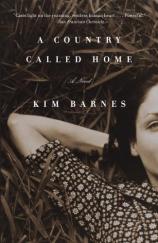Reading Group Guide
Discussion Questions
A Country Called Home

1. Why does Kim Barnes begin A Country Called Home with a prologue and end it with an epilogue? How do these two sections create a frame through which to view the novel?
2. Part One of the novel is preceded by an epigraph by John Gardner: “The fall from grace is endless.” Why would Barnes choose this quote? In what ways is A Country Called Home about the fall from grace?
3. How are the novel’s three main male characters—Thomas, Manny, and Lucas—alike? How has each been shaped by his past?
4. Thomas and Helen are motivated to move to Idaho by a romantic dream of a simpler life in nature and by a rejection of the wealth and empty social conventions of Helen’s parents. What causes their dream to unravel so quickly? Is the novel suggesting that such dreams are inherently flawed, or only that Thomas and Helen lack the practical skills to make theirs last?
5. Helen says of her son’s death: “the shame that came of his short life had never been spoken, his death never acknowledged” (p. 118). Why don’t Thomas and Helen ever talk about or acknowledge their son’s death? Is the fact of his death or their repression of it more damaging to their relationship?
6. Thomas blames himself for Helen’s death, just as Helen’s mother blames him. Is he, in fact, responsible for her death?
7. Manny wonders, “Was it loneliness that had sent Helen into the water? Despair?” (p. 149). What was her reason for setting herself adrift in the river? Was it a suicide? What role did her making love with Manny play in her death?
8. How sympathetic is Thomas? Does he invite empathy or judgment, or some mixture of both?
9. Near the end of the novel, during the frantic search for Elise, Lucas feels that he is guided to her: “The dog, the pharmacist, the barrette—it had been easy enough to believe he was being led by fate to some fairy-tale rendezvous with Elise” (p. 262). Is it fate that leads him to Elise? Does fate seem to play a role in the lives of all the main characters in the novel, or are their experiences determined more by their personal histories and free choices?
10. Why is Elise so easily drawn into the fundamentalist Pilgrim Holiness Church? What unmet needs does the church seem to fill? How does being in the church affect her?
11. A Country Called Home describes a world where children are abused, abandoned, and neglected, where pain and suffering get passed on from one generation to the next. And yet the birth of Elise and Lucas’s child seems hopeful. What are the chances that Lucas and Elise can break the cycle of abuse and neglect that they have suffered and raise their child in a more loving way than they were raised?
12. How does the setting of the novel affect its outcome? In what ways do the plants and animals and natural surrounding of back-country Idaho shape the course of the story?
13. What is the significance of the novel’s title, A Country Called Home? What role does home and the idea of home play in the novel? Why do so many of the characters seem to lack a solid sense of home?
14. What roles does Thomas’s drug addiction play in the novel? What is he trying to shut out through his addiction?
15. In what ways does the past seem to control, or at least influence, the present in A Country Called Home? How do the main characters try to repress or escape the pain of their pasts? What does the novel as a whole seem to be saying about the relationship between past and present?
A Country Called Home
- Publication Date: October 6, 2009
- Genres: Fiction
- Paperback: 288 pages
- Publisher: Anchor
- ISBN-10: 0307389111
- ISBN-13: 9780307389114








